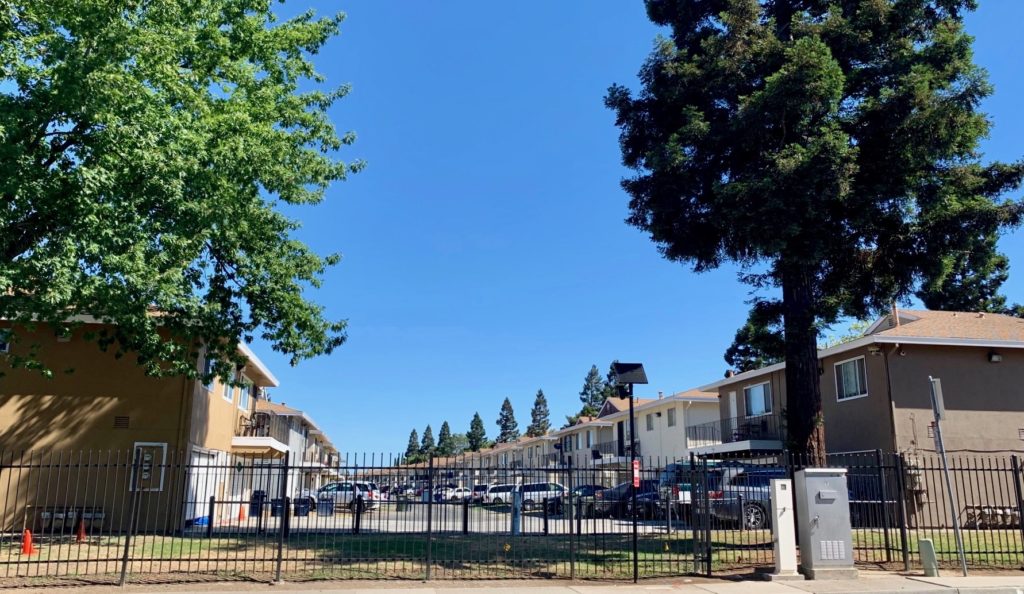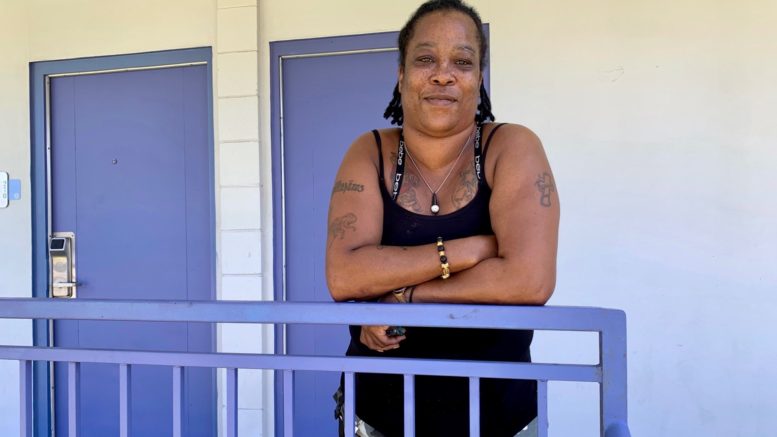A bill largely ignored by the media may be California’s last chance to avoid disaster for tenants
By Scott Thomas Anderson
With California’s long-feared eviction reckoning on the horizon, corporate landlords have already used loopholes to throw tenants onto the streets throughout the COVID crisis, as one Sacramento woman recently learned when she and her three sons were ejected from their apartment after the oldest boy got shot four times while walking on the grounds. The disabled teen barely survived that attack, and an official notice from managers at the complex shows they used the shooting as justification to evict not only him, but his mom and 12-and-9-year-old brothers – smack in the middle of the pandemic.
The family is now homeless.
The complex maintains that it acted appropriately on behalf of other residents.
Given the extent to which rental companies have already flouted the mission behind California’s current displacement efforts, the question of what those entities will do once the state’s eviction moratorium expires June 30 – and the federal moratorium a month after that – has housing advocates fearing the worst, particularly if Gov. Gavin Newsom is not able to pull off the last-ditch compromise he’s reportedly been working on.
The only prospect equally worrying them is that Wall Street is using the pandemic’s financial fallout to go on a spending spree, outbidding and outspending would-be homebuyers across the U.S. in an effort to transform American society, in the words of one commentator, into a corporate “landlord nation.”
From the hospital to homelessness
Like most Californians, Sheena Haskin and her children spent 2020 trying to ride out the pandemic at home. In their case, “home” was an apartment at Phoenix Park in South Sacramento. The 400-unit complex is owned and operated by the John Stewart Company, which claims to be the largest affordable housing manager in California – and the 6th largest nationwide.
The Haskin family had been living there since June of 2018.
In April of the following year, as COVID-19 hospitalizations were soaring in Sacramento, Phoenix Park’s management began hitting Haskin with lease violations. Haskin maintains that the grounds for all of them had nothing to do with her or her kids. Haskin’s unit was about 20 feet from the complex’s dumpster area, where random scavengers often foraged. Haskin was given a violation for these strangers urinating on the garbage cans. Next, Haskin was handed a violation when people who she says she didn’t know sped inside the complex and then parked near her unit. On another occasion, Haskin’s nephews took her disabled 19-year-old son Tivon to go clothes shopping. After they returned, one asked to use her bathroom, which resulted in her getting another violation on the charge that her nephews were loitering.
Perhaps the most bizarre incident involved the night when Haskin’s next-door neighbors got into some kind of domestic violence entanglement, and she, not having even seen it, was docked with a lease violation.
Finally, Haskin says that some individual – she was never told who – was pulled over in the area by the police gang task force and falsely gave his address as her unit. This information was relayed back to Phoenix Park’s management, which resulted in another lease violation.
“That’s definitely not true,” she said of the claim. “And every time something went on near my building, that had nothing to do with me, I’d get a violation. And it mattered because all of those violations were later used against me … At one point, Phoenix Park’s security told me that if anything happened near my apartment, if I didn’t report it myself, I’m gonna be in trouble.”
Paperwork from the John Stewart Company, which was provided to SN&R, confirms that managers issued numerous lease violations to Haskin that were consistent with the circumstances she describes; however, it’s also clear that managers believed, or assumed, her unit was connected in one way or another to the ongoing problems.

On Aug. 18, 2020, Tivon had just finished his dinner when he asked to go out and visit a female friend at a nearby park. Haskin told the 19-year-old he could, though such things always worried her a bit: Two weeks before, someone had been firing a gun just down the street. Tivon headed out. About three minutes after he left, Haskin’s phone lit up with a FaceTime call. It was Tivon.
“Mom, I’ve been shot, please help me,” he said.
Haskin rushed outside, frantically searching for her boy. By the time she found Tivon in a shadowed ally, he was on the ground, moaning and losing consciousness. The teen had taken four rounds to the torso. Both his lungs were punctured, as was his spine.
“I knelt down next to him and cut his shirt off to expose his wounds,” Sacramento police officer Joshua Lilley wrote in his report. “I tried to comfort [the victim] and reassure him as we waited for medics … I gave him several sternum rubs to help him stay conscious.”
Lilley added that Tivon did not seem to know who shot him, nor where they’d been positioned when they fired.
The next day, as Tivon was in the hospital fighting for his life, Haskin was so worried about the prior admonishments from Phoenix Park’s security that she called its management to tell them what had happened. Two days after that, Haskin was served with a 3-day notice to quit the premises. The reason given was that management believed that Tivon – the victim of the near-fatal attack –was responsible for people firing guns in the complex.
“At 10:53 p.m., Tivon Biggs was outside in the common area in violation of the quiet hours when unknown person(s) discharged 20 rounds of ammunition directly at him,” the mangers wrote directly under the emboldened sentence, Reason to Terminate Tenancy. “It was reported by the Sacramento Police Department that Tivon Biggs admitted that at the time of the incident, he was outside the unit smoking marijuana.”
The notice adds that someone with the Sacramento Police told management that Tivon was a member of the Oak Park Bloods, though the police report for the incident makes no mention of that, while describing Tivon as an unarmed victim who was mowed down.
The eviction left Haskin in disbelief. She says Tivon had never had any run-ins with the law.
“My son has never been in a gang and his record is squeaky clean,” she attested. “The Sacramento Police Department hadn’t even finished its investigation, so how could Phoenix Park think it knew what happened?”
Haskin spent the better part of last fall and winter trying to fight her eviction in court, with the help of legal aid. It cost her nearly $2,000 in legal fees, yet her displacement still seemed inevitable.
The dreadful waiting game was especially hard on her 12-year-old son.
“He said, ‘Mom, how are they going to put us out in the cold with coronavirus out there,’” she remembered. “Now, he doesn’t really know what that means, but he knows it’s something not good.”
On Feb. 26 of this year, two Sacramento Sheriff’s deputies arrived to tell the Haskin family they had to go. Haskin says that she cleaned the apartment well, only avoiding some dangerous black mold in a closet that Phoenix Park’s maintenance had long neglected to fix. Haskin stresses that she repeatedly asked for management to do walk-through inspection with her, but was refused.
Then the real kicker – the complex was keeping her $500 security deposit, along with a $650 over-pay credit she was owed. It was also handing her a new bill for $1,084.
The John Stewart Company told SN&R this week that it handled Haskin’s tenancy professionally, and that it stands by its decision to evict her.
“Ms. Haskin’s tenancy was legally terminated for health and safety reasons,” John Stewart Company Vice President Tracy Esposito wrote in an email. “The John Stewart Company worked closely with Ms. Haskin and her attorneys to (a) provide several extensions of her move-out date, and (b) helped her find alternative housing and moving assistance. We do not comment on specific security deposits, but generally only retain them when legally authorized to do so for repairs, cleaning or back rent. We categorically reject any allegation that Ms. Haskin was harassed or otherwise treated unfairly.”
Members of the statewide group Alliance of Californians for Community Empowerment, or ACCE, have since been trying to help Haskin exercise her rights. Anya Svanoe, the group’s communications director, says that what happened to Haskin speaks to many more unsettling stories playing out across California.
“It’s indicative of how the state and local eviction protections have failed,” Svanoe told SN&R. “This is a story of how landlords are using harassment and other tactics to get renters out. Right now, there’s no consequences for harassment. Landlords can just do what they want.”
And Phoenix Park’s management hasn’t stopped haunting Haskin’s life. She currently has a Section 8 Housing voucher, and an acceptable credit score, but she can’t find a new apartment. She says it’s because Phoenix Park keeps sending negative references every time she applies at a new complex.
This has literally split Haskin family apart, as Haskin has had to send her two youngest sons to live with relatives as she floats between motel rooms – and maybe, soon, her car.
“The stress of all this, it’s like waking up every morning and praying – I don’t even know how to explain it,” she said. “Sometimes I just want to give up, but I can’t because of my kids.”
Darkening rental clouds ahead

While it’s difficult to compare the toll of the pandemic to previous U.S. calamities, there is one element where a clear parallel has emerged, and on that score, history isn’t just “rhyming” with itself, it’s nearly parroting itself.
In 2008, the private equity firm Blackstone Group set upon Sacramento’s ocean of underwater homeowners like a Megalodon shark, swallowing up so many single-family units that it became the largest private property owner in county. These acquisitions on-the-cheap were converted into rental homes, making Blackstone a Sacramento real estate behemoth that blots out the benefits of smaller, more-local landlords. At the same time, Blackstone began earning the reputation of an absentee corporate owner allegedly involved in price gouging.
While Sacramento’s elected officials and community organizers have struggled to contain Blackstone’s impact on working people and the housing crisis, its model is something that Wall Street likes – and has spent nine years learning to perfect. This includes corporate entities like Blackstone allegedly optimizing profits through rent hikes, serial evictions, hostile fee-collecting strategies and skirting maintenance investments on units.
A recent study found that the top billionaire residential landlords in the state have amassed more than $55 billion in revenue and holdings, all while managing to increase their collective wealth by $7.9 billion since the pandemic began. The mandatory lockdowns and layoffs that plagued California during 2020 triggered an economic fallout that rivaled the 2008 financial collapse; and Wall Street hasn’t been missing the opportunity to capitalize again.
Numerous corporations, including one owned by the controversial Koch brothers, have been going on another massive home-buying spree. The top ten richest corporate landlords in California alone had $191 billion in “cash-on-hand” for that mission in March.
One of the latest players to come under new scrutiny is BlackRock, a multinational investment management corporation that’s been out-bidding aspiring homeowners all over the country, including infamously sweeping up an entire neighborhood of single-family homes in Conroe, Texas. BlackRock’s property rush has coincided with the median price of an American home jumping by 28% in the last two years.
Media analyst Krystal Ball, formerly of The Hill, recently described where these trends are heading in a video editorial.
“Private equity giants, hedge funds and other economic royalists are buying up houses, in some cases entire neighborhoods, and then they’re either getting directly into the landlord business or they’re flipping them to entities that will rent the suburban American dream to you,” Ball explained. “Does that sound to you like the kind of healthy growth that’s going to lead to vibrant and sustainable communities? Of course not. It’s another disaster in the making … You’ll be doomed to have some private equity goon as your landlord, applying their Harvard education to come up with new ways to squeeze every penny they possibly can out of you.”
On the state level, Assemblyman Mike Gipson of Compton recently introduced Assembly Bill 1199 – or the Homes for Families Bill – which would put an excise tax on multi-million-dollar corporate landlords. Its revenues would be used to fund rental assistance and home ownership programs for working people. The bill would also put new transparency mandates on corporations like Blackstone Group, BlackRock and the Koch Brothers’ various entities. Gipson’s team thinks that AB 1199 could generate as much as $1 billion annually. The measure is currently pending a hearing in the Assembly Committee for Revenue and Taxation.


Be the first to comment on "As Wall Street looks to conquer what’s left of the rental market, a Sacramento mother of three’s eviction story hits home"